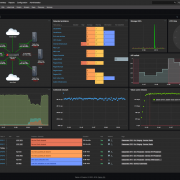Cum aflam versiunile expirate de WordPress de pe Server
 Facem un fișier în care vom adăuga comanda de căutare a wordpress instalate pe server:
Facem un fișier în care vom adăuga comanda de căutare a wordpress instalate pe server:
vi /usr/bin/gaseste_wordpress
– și adăugam în el:
<?php
define('LATEST_VERSION', '3.8.1');
if(!isset($argv[1])) die("Please start this program with " . $argv[0] . " <web pase bath> [<csv file>]\n");
// set the base path
define('BASE_PATH', $argv[1]);
define('OUTFILE', (isset($argv[2]) ? $argv[2] : false));
// check that provided path exists
if(!is_dir(BASE_PATH)) {
die(BASE_PATH . " is no valid path.\n");
}
// define array to store the installation paths
$wp_inst = array();
/* main function to loop through paths recursively */
function path_loop($path) {
global $wp_inst;
// make sure path ends with a slash
if(substr($path, -1) !== '/') $path .= '/';
// open dir
$dir = opendir($path);
if(!$dir) {
print "[WARN] Could not access " . BASE_PATH . "\n";
return false;
}
// loop through everything this dir contains
while($cur = readdir($dir)) {
// we only want to read paths, not files
if($cur === '.' || $cur === '..' || is_link($path . $cur) || !is_dir($path . $cur)) continue;
if(($cur === 'wp-content' || $cur == 'wp-admin' || $cur == 'wp-includes') && array_key_exists($path, $wp_inst) == false) {
// this seems to be a wordpress installation path
// check for the version file now
$versionfile = $path . 'wp-includes/version.php';
if(!file_exists($versionfile) || !is_readable($versionfile)) continue; // cannot read the file
// we don't simply include the file for security reasons.
// so store it in a variable
$cont = file_get_contents($versionfile);
// search for the version string
$found = preg_match('/\$wp_version\s*=\s*(["\'])([0-9\.]+)\\1;/', $cont, $match);
if(!$found) continue; // we found no version string in the file... strange.
$wp_inst[$path] = $match[2];
print '[INFO] found wp version ' . $match[2] . ' in ' . $path . "\n";
}
path_loop($path . $cur); // we dive into the dir even if we found wp here.
}
// free resource
closedir($dir);
}
// start the loop process
path_loop(BASE_PATH);
// some statistic variables
$current = 0;
$outdated = 0;
if(OUTFILE) $fp = fopen(OUTFILE, 'w');
// loop through all found versions
foreach($wp_inst as $path => $version) {
// is the found version lower than latest one?
if(version_compare($version, LATEST_VERSION, '<')) {
$outdated++;
print '[WARN] outdated wordpress version ' . $version;
} else {
$current++;
print '[OK] current wordpress version ' . $version;
}
print ' in ' . $path . "\n";
if(OUTFILE) fputcsv($fp, array($path, $version, LATEST_VERSION), ';', '"');
}
if(OUTFILE) fclose($fp);
// print summary
print "We found " . count($wp_inst) . " wordpress installations, of which " . $outdated . " are outdated and " . $current . " are up to date.\n";
?>
– după ce am adăugat conținutul și am salvat, îl facem executabil
chmod 777 /usr/bin/gaseste_wordpress
– și putem rula asa (calea care dorim sa o scaneze este cu rosu, și unde vrem sa fie rezultatul scanării cu verde):
php /usr/bin/gaseste_wordpress /var/www/ /var/www/wordpress.expirat
– la sfîrșit va zice ceva de genul:
We found 65 installations, of which 6 are outdated and 59 are up to date.
– și vom găsi exact cele care sunt expirate în fișierul cu rezultatul scanării
Sursa: (c) 2014 howtoforge.com (M. Cramer) <m.cramer@pixcept.de
Știri:
- Comment on How to Fix a Hacked Website: A Step-by-Step Recovery Guide by Tess Needham
- Comment on How to Fix a Hacked Website: A Step-by-Step Recovery Guide by Tess Needham
- Comment on Introducing Selective Push and Pull in WordPress Studio by Tess Needham
- Comment on How to Fix a Hacked Website: A Step-by-Step Recovery Guide by Chris Martin
- Comment on Introducing Selective Push and Pull in WordPress Studio by Md Herdoy Almamun
- Comment on How to Fix a Hacked Website: A Step-by-Step Recovery Guide by Ryan
- Comment on How to Make a Favicon for Your Website (And Why You Should) by Tess Needham
- Comment on How to Make a Favicon for Your Website (And Why You Should) by Prabeen Pati
- Comment on How to Add Schema Markup to WordPress Sites (And Why You Should) by Tess Needham
- Comment on How to Add Schema Markup to WordPress Sites (And Why You Should) by Tess Needham








Leave a Reply
Want to join the discussion?Feel free to contribute!